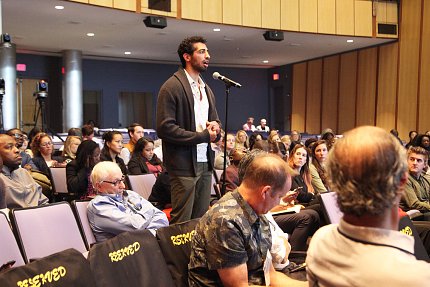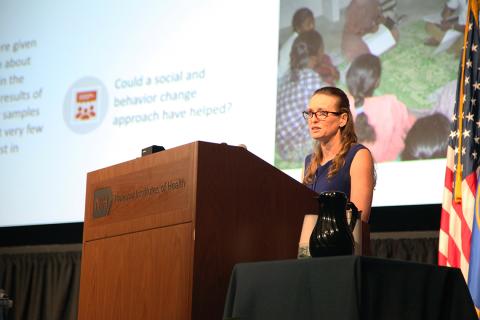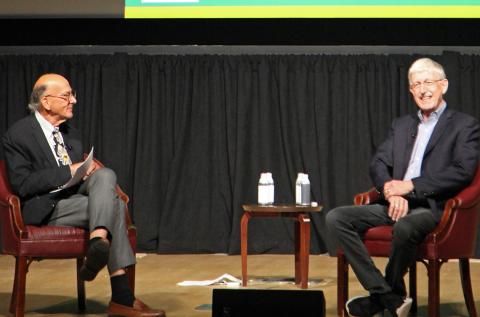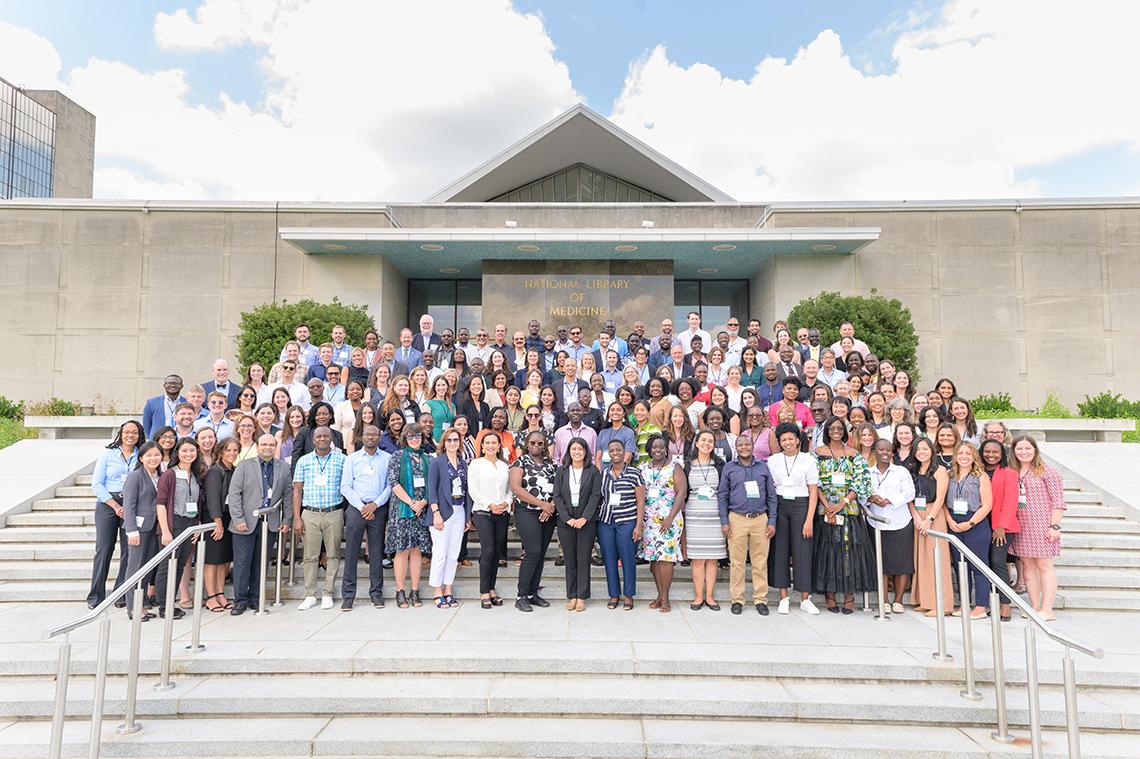Fogarty Welcomes International Fellows

Photo: Judy Coan-Stevens
For the first time since 2019, the Fogarty International Center (FIC) hosted the latest cohort of fellows and scholars from the Launching Future Leaders in Global Health Research Training Program in-person on NIH’s Bethesda campus. The event, co-sponsored by Fogarty and several other NIH institutes, marked the 20th anniversary of the program known as “LAUNCH.”
Participants from every corner of the globe convened at the Ruth Kirschstein Auditorium in the Natcher Conference Center for a week-long orientation, during which they received insights from distinguished alumni, principal investigators and NIH leadership.
Warm Welcome
Fogarty Acting Director Dr. Peter Kilmarx opened the event by tracing his career journey in global health, urging the group to “focus on the future while still taking things day-by-day.” He also emphasized the importance of seeking mentorship and staying receptive to new opportunities.
NIH Acting Director Dr. Lawrence Tabak then highlighted the profound connection between the LAUNCH fellowships and the broader NIH mission. He offered valuable advice, noting that “being surrounded by intelligent peers rather than necessarily being the smartest person in the room will be instrumental in your career in research and public health.”

Photo: Merrijoy Vicente
Several LAUNCH alumni were also present to welcome the newcomers. Dr. Jacqueline Firth, one of Fogarty’s inaugural fellows and now chief of the U.S. Agency for International Development (USAID) pediatric and maternal clinical HIV branch, spoke about the significance of community engagement in research. She shared how her own FIC project had a transformative impact on her career, underscoring the importance of understanding different cultures when collaborating with diverse groups.
“The bottom line is, when you want to work with a group, you need to have a deep understanding of what their culture is and what is important to them, as it defines how they view power and partnerships and how you can effectively collaborate with them,” said Firth.
Dr. Magaly Blas, another esteemed former fellow and the founder of Mamas del Rio, an organization providing a voice for women and children living in remote parts of the Peruvian Amazon, provided valuable guidance on securing crucial mentorship for success in global health research. With a wealth of experience from Universidad Peruana Cayetano Heredia, Blas equipped attendees with indispensable tools and strategies to establish and maintain fruitful mentorship relationships.
Global Health Challenges
The third day commenced with an engaging ‘fireside chat’ between former Fogarty Director Dr. Roger Glass, president of the China Medical Board, former National Institute of Allergy and Infectious Diseases (NIAID) Director, Dr. Anthony Fauci and former NIH Director Dr. Francis Collins. Discussions centered on the impact of global health research on policymaking and addressing emerging health challenges. Fellows had an opportunity to interact with speakers, ask questions and refine their elevator speeches.

The conversation delved into topics such as mentorship, the development of the PEPFAR (President’s Emergency Plan for AIDS Relief) program launched 20 years ago, and the challenges brought on by the Covid-19 pandemic. Fauci acknowledged that “combating misinformation in the wake of the pandemic presented one of the most significant challenges for upcoming fellows,” while also emphasizing the importance of promoting vaccine adherence and preventing future pandemics.
Collins, on the other hand, shared with the trainees the success of the H3Africa program, a joint project of NIH, the Wellcome Trust, and the African Academy of Sciences, which facilitates fundamental research into diseases on the African continent while also developing infrastructure, resources, training and ethical guidelines to support a sustainable African research enterprise. He shed light on the program’s upcoming phase, which involves establishing Centers of Excellence in Africa. He recounted how his own fellowship experience in Nigeria had a profound impact on his subsequent research career.
“Get ready, because this experience will have a profound impact on you,” Collins said. “Don’t be surprised if it becomes a calling that you weren’t expecting but will inevitably be irresistible.”

Staff from other institutes and centers from across NIH—including the National Heart, Lung and Blood Institute, the National Institute of Diabetes and Digestive & Kidney Diseases, the National Institute of Mental Health, the National Institute of Environmental Health Sciences (NIEHS) and the National Institute of Neurological Disorders and Stroke, highlighted their ongoing support for this program and the trainees. NIEHS Director Dr. Richard Woychik said, “We at NIEHS are so grateful for the expertise of the fellows whom we’ve supported over the years.”
The remaining orientation sessions offered practical advice on time management, budgeting and safety, essential for navigating their ‘Fogarty year.’ Other discussions focused on decolonizing global health, fostering south-to-south partnerships, addressing climate change and promoting equitable representation in research.
A Rewarding Journey
LAUNCH is Fogarty’s flagship global health training program, which provides mentored research training for fellows and scholars from both the U.S. and low- and middle-income countries (LMIC) at established biomedical and health research institutions and project sites.
Over the last two decades, U.S. and LMIC trainees have embarked on their ‘Fogarty year’ with this orientation at NIH before being embedded into established research teams. The cherished tradition continues to provide an opportunity for the new cohort to connect, discuss vital global health topics and become energized and inspired as they begin their research endeavors.
Reflecting on his FIC tenure, Glass commented that its “most rewarding aspect was the chance to travel the world, forge connections with former Fogarty [and other] NIH fellows, and witness firsthand how their work continues to impact global health in the present day.”

